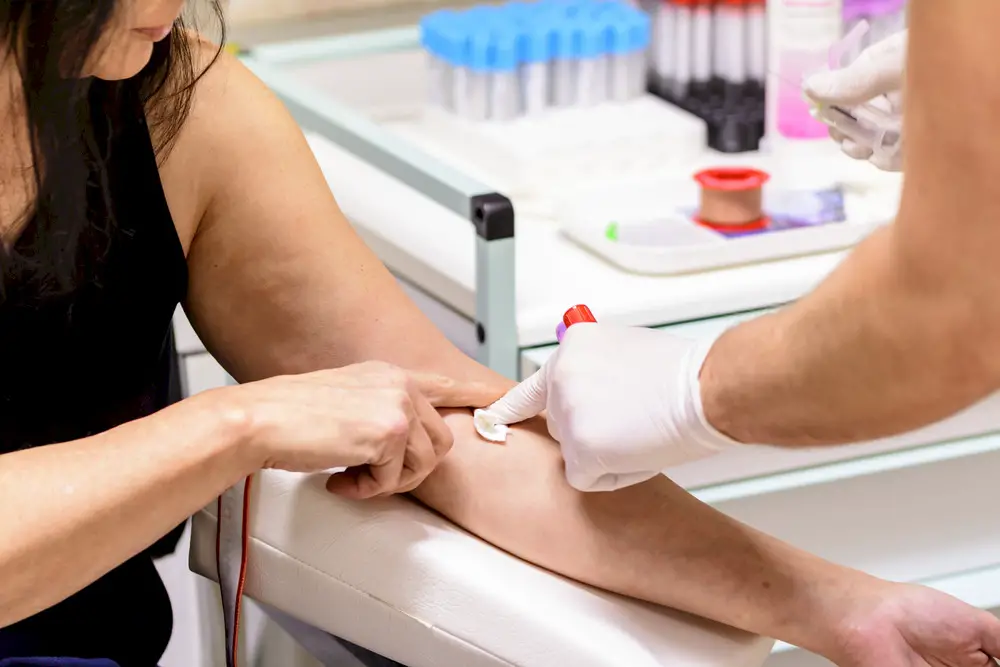Blood tests are used for a myriad of reasons, and each test can be used to detect a different abnormality. Upon exploring your symptoms or concerns, a general practitioner may advise a blood test to help ascertain any underlying medical condition. For example, this could be to further investigate problems arising from the kidneys, to the liver, to the heart, to the thyroid, and everything in between.
Blood tests are commonly used to diagnose certain diseases, including some cancers, diabetes, heart disease, liver abnormalities, hormonal problems, diabetes and sexually transmitted diseases, including HIV/AIDS. Infections, both bacterial and viral, are often detected through blood testing as well.
Despite the enormous array of tests available, there are typically some key tests performed in the first stages of investigation, as detailed below.
What Do Blood Tests Reveal?
Full Blood Count
The full blood count (FBC) is a common blood test which examines 10 components of every major cell of your blood: white blood cells, red blood cells, and platelets. Some of the most important aspects of this test are the haemoglobin, red blood cell count and mean cell volume, which tells us a great deal about abnormalities with the red cells in the body, in particular if you have anaemia (low levels of red cells).
An FBC will help identify issues such as anaemia, blood clotting issues, blood cancers, infections, and immune deficiencies (when your body may not be producing enough white cells to fight infections).
Basic Metabolic Panel – Kidneys, Diabetes & Bones
The basic metabolic panel is used to identify kidney disease, diabetes and calcium abnormalities (which is found in bone disorders).
It measures the levels of eight compounds in the blood: calcium, glucose, sodium, potassium, bicarbonate, chloride, blood urea nitrogen (BUN), and creatinine.
Comprehensive Metabolic Panel – everything above + Liver Function Testing

A Comprehensive Metabolic Panel (CMP) includes all tests from the BMP as well as detailed liver function analysis.
This tests for a number of proteins and enzymes that relate to liver disorders, including Albumin, total protein, alkaline phosphatase (ALP), alanine aminotransferase (ALT), aspartate aminotransferase (AST), and bilirubin.
Abnormal Liver function tests can indicate liver disorders such as gallbladder inflammation, gallstones, fatty liver deposits, hepatitis (inflammation), liver cancers and wider liver damage (eg cirrhosis).
Detecting these abnormalities early can help in diagnosis and treatment options, as many are reversible with early intervention.
Lipid Panel
A lipid panel looks at your full lipid (fats) profile. It includes cholesterol levels and a breakdown of your lipids: high-density lipoprotein (HDL)- “good” cholesterol, or low-density lipoprotein (LDL)– “bad” cholesterol.
The reason that HDL is considered ‘good’ is because it helps removes substances from the blood that can be harmful and breaks them down into waste with the help of your liver. LDL is termed ‘bad’ because it can cause plaques and deposits in arteries and other organs.
Abnormal lipids tests, while worrying, are reversible and a doctor and/or nurse will help discuss the ways to improve these results and reverse any abnormalities.
Sexually Transmitted Infection Tests
Sexually transmitted infections (STIs) can be identified through blood tests depending on the infection and/or timing from a recent concerning sexual encounter.
These blood tests can identify and diagnose chlamydia, gonorrhea, herpes, HIV, and syphilis, to name just a few infections.
Cancer Markers
There are now a number of blood tests that can help identify certain cancers at an early stage. This includes tests such as the Prostate Specific Antigen (PSA) and CA-125 (a test for ovarian cancers). These tests are performed in conjunction with a history of symptoms and medical examination and can be a valuable tool in early detection of cancers.
Other Blood Tests – Sex hormones, Thyroid levels, Cardiac markers, Vitamins and more
There are a wide range of blood test options in addition to the above, such as thyroid panels, female specific tests (relating to the reproductive cycle), cardiac biomarkers, coagulation panels, fertility tests, iron studies, vitamin levels and infection and inflammatory markers, to name just a few.
Your general practitioner can advise and tailor testing depending upon your symptoms and needs. This helps your doctor help identify underlying conditions at an early stage and plan your next steps in investigation or treatment.
